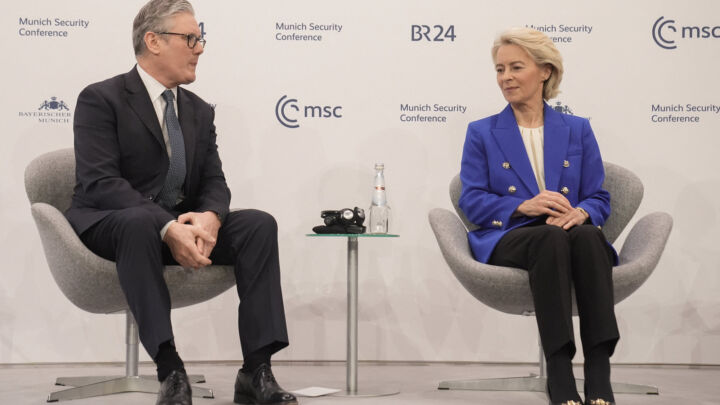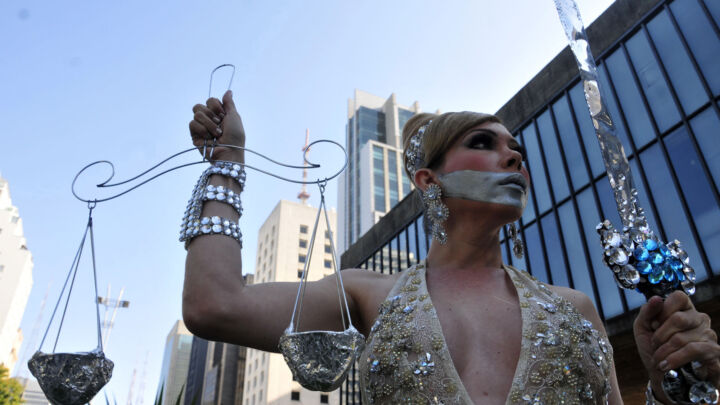The Gen Z gender war
The terminally online young have a dangerously warped view of the opposite sex.

Want unlimited, ad-free access? Become a spiked supporter.
‘Do men even like women?’ This question has gripped Gen Z women over the past few years. Type it into a search bar and you’ll find a churn of blog posts, TikToks and Reddit threads, many arriving at the same bleak conclusion: heterosexual young men might just be incapable of love.
The tone is not subtle. ‘Do straight men even like women at this point?’ ‘Do men really love women, or do they just use them?’ ‘If sex wasn’t a possibility would men ever even be nice to us?’ These appear to be common anxieties. On Substack, one woman writes: ‘You need only look at the rape rates to know that men think women owe them sex… Women are accessories designed to serve men… So few men actually love their partners.’ On TikTok, another insists: ‘Men like pleasure. They only like women because of what women do for them.’
All this certainly expresses a bleak view of young men’s attitudes to women. But then we women don’t appear to like men very much, either.
A Whitestone Insight poll from earlier this year found that 62 per cent of women aged 18 to 24 consider men their age ‘pretty frightening’. In 2024, when a viral TikTok interview asked women whether they’d rather be alone in the woods with a man or a bear, most chose the bear. ‘Bears don’t always attack you’, laughs one respondee.
Although crime stats show the very real problem of male violence against women, it does seem that the average young British woman now believes she takes a great risk every time she leaves her home. Of course, all women ought to have their wits about them out on the town (and men, too, for they are statistically far more likely to be physically assaulted). But when vigilance spirals into fear, and fear into quiet loathing, the inevitable outcome is a society of distrust. And when young women begin to believe a significant portion – perhaps even a majority – of heterosexual men harbour an intense desire to hurt women, things do not bode well for cross-gender relations.
This breakdown in basic trust between young women and men cuts both ways. While women are stumbling across a grizzly in the wilderness and breathing a sigh of relief that at least it’s not a man, men in turn are growing increasingly suspicious of their female counterparts. Young men now frequently express reluctance to approach women at all. Almost half of young men claim they have never done so, for fear of rejection and social ridicule. 53 per cent of men aged 16 to 24 agree with the disheartening statement that ‘the majority of women are only attracted to a small subset of men’, with 50 per cent perceiving ‘physical attractiveness’ to be the factor women most prioritise in a partner. A further 39 per cent believe it to be ‘financial status’. The fact that women taking part in the same poll actually placed humour and kindness as their top priorities is not likely to change young men’s views.
Their situation certainly won’t be helped by the contradictory messages being sent by the mainstream media. Alongside countless commentaries urging men to open up about their feelings of loneliness and abandonment, there are others criticising ‘mankeeping’, a term for the ‘emotional labour’ of women who have to put up with partners who open up a bit too much.
There is also a distinctly political dimension to this growing rift. Young women continue to be more progressive overall, while their male counterparts lean increasingly right. This makes Gen Z not only the most romance-deprived, but also the most politically polarised generation in recent memory.
Perhaps this, in itself, would not be such a big issue were more of us willing and able to seek common ground and test our ideas against one another. But amid so much political intolerance, that is proving to be very hard. Too many on the left tend to dismiss socially conservative men as sexist and racist. While on the right, there has long been a tendency to dismiss left-leaning women as ‘libtards’, ‘baby-killers’ and misandrists.
There are several factors at play in the fear and loathing now prevailing between the sexes. With one in four UK families now being single-parent households, a sizeable proportion of young people have grown up without a model of a functional male-female relationship. Then there’s the corrosive influence of pornography. The average age of young people’s first exposure to porn has dropped to 12, while the average age of a real-life sexual encounter remains 17. It means that too many young people have a warped idea of sex before having any intimate contact with the opposite sex. Given the influence of porn, no wonder young people are so wary and fearful of a physical relationship with the opposite sex.
Some perspective is needed here. Online views of the opposite sex tend to be extreme. During day-to-day interactions, you are unlikely to have a woman tell you that men have been ‘using us and murdering us since the beginning of time’ as she applies her leopard-print eyeshadow. Nor are you likely to witness a man calmly explain to a roundtable of women why he considers them whores.
But given how much time Gen Z spends online, exposed to divisive, fear-mongering views of the opposite sex, perhaps it’s no surprise that so many of us are on edge. While young women suspect the cult of the ‘manosphere’ is lurking everywhere, many young men stew in demoralised silence, cowed by the constant portrayals of men as either ‘pathetic’ or inherently harmful. It is not a great leap to imagine young men’s unhappiness slowly curdling into resentment. As one report noted, ‘a generation of unhappy and angry men is a disaster for both sexes’.
As it stands, the influence of porn, the decline of the two-parent family unit and the rise of red-pilled grifters pose serious challenges to young people. But perhaps one way to overcome the two-way online scorn-fest would be to focus on real-world interactions. Perhaps then we’d discover that most men are not out to hurt women, and most women have no interest in seeing men humiliated. If we can only peer out from the dark recesses of the algorithm long enough, we may realise that, most of the time, the person opposite us is not someone to be scared of.
Georgina Mumford is a spiked intern.
You’ve hit your monthly free article limit.
Support spiked and get unlimited access.
Support spiked and get unlimited access
spiked is funded by readers like you. Only 0.1% of regular readers currently support us. If just 1% did, we could grow our team and step up the fight for free speech and democracy.
Become a spiked supporter and enjoy unlimited, ad-free access, bonus content and exclusive events – while helping to keep independent journalism alive.
Monthly support makes the biggest difference. Thank you.








Comments
Want to join the conversation?
Only spiked supporters and patrons, who donate regularly to us, can comment on our articles.